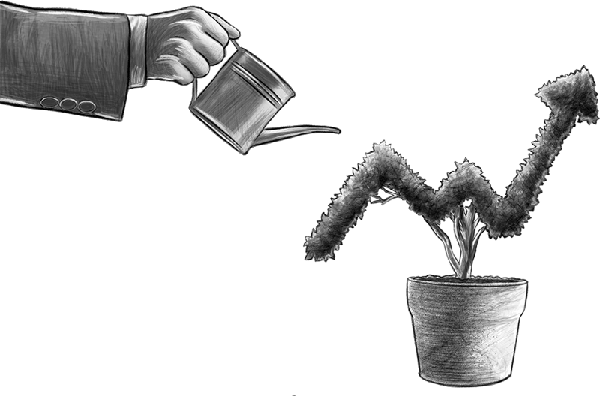Consistency Over Perfection

Hi, The Investor’s Podcast Network Community!
Happy Saturday!
Today is the renaissance painter Leonardo da Vinci’s birthday 👨🏻🎨
He’s known to be one of history’s most talented painters, sculptors, and architects.
His most famous paintings are the Mona Lisa, Lady with an Ermine, and The Last Supper. The most expensive one, Mona Lisa, is estimated to be worth $860 million🎨
Today, we’ll discuss how to make progress, and more, in just 4 minutes to read 📖
Understand the financial markets
in just a few minutes.
Get the daily email that makes understanding the financial markets
easy and enjoyable, for free.
History of positive returns ✔️
Inflation-hedging potential ✔️
Resistance to market volatility ✔️
Land has helped investors preserve wealth for generations, and AcreTrader makes it easy to diversify with farm and timberland assets online — Find out how.
Don’t hold back
The most common reason people give up on pursuing their deepest desires is procrastination, in other words, “lacking control of oneself” or acting against one’s better judgment.
And this issue is enduring, the ancient Greek philosophers — Socrates and Aristotle — invented a word that captures such behavior: Akrasia.
As humans, it’s natural for us to question whether we have a genuine opportunity to excel in a specific area of interest. On top of that, we often presume that if we aren’t inherently gifted in that area, then it’s not worth pursuing. And even if we are, we think we need to be perfect.
For these reasons, we hold back from changing our reality rather than taking baby steps forward.
According to Sahil Bloom, an inspiring investor, entrepreneur, and writer, one of the most fulfilling things you can experience is progression.
He argues progression gives him a sense of accomplishment which ultimately drives him to become a better writer.
Procrastination or doubt can be obstacles to elevating our careers and being exceptional in what we do. What we can learn from Sahil is that we can’t upgrade our capabilities, skills, and knowledge without embracing the painful process of continuous learning and progress.
Practice makes perfect
Someone who knows a great deal about practicing and progressing in his craft is the famous comedian Jerry Seinfeld.
Jerry Seinfeld has successfully produced thousands of timeless jokes and has accumulated a fortune of nearly $1 billion through 45 years of professional comedy and acting.
He earned $100,000 for the first season of Seinfeld, but by season 9, he was paid over $1 million per episode.
How do you stay on top for years? Is it plain luck, talent, or persistent practice?
Probably, it’s all of the above, with an emphasis on practice and consistency.
Jerry Seinfeld, although talented, hilarious, and definitely a gifted person, has highlighted on many occasions that his greatest feature is his dedication to continuous improvement. He’s stated that what seems to be pure talent is, in fact, years of writing jokes every single day.
He once admitted that if you want to be a better comedian, you have to write better jokes, and to do that, you have to write every day. Only then can you master your skills and improve.
It’s simple, yet it’s also brilliant because it applies to everything in life.
Consistency is the secret
Seinfeld committed to practicing comedy every day. It was his lifeblood, an obsession.
This is why he started using a calendar as visual proof of his dedication.
The Seinfeld Calendar Framework:
- Hang a big calendar on the wall.
- Use a marker to put an X over every day that you complete your daily habit.
- Don’t break the chain of Xs under any circumstances!
He recognized that once he’d hit a chain of a few Xs in a row, he’d want to avoid breaking it off. Sounds simple, doesn’t it?
Committing to something you’d like to improve is the fundamental action in that process. If you do something once and stop doing it, it won’t become a habit.
But if, on the other hand, you repeat doing something for 10 days, you’re likely to continue doing it, especially when you can see a visual reminder of how much effort you’ve already put into pursuing your goal.
The 30-30 Challenge
Based on Seinfeld’s framework, Sahil Bloom came up with another one.
It’s easy to implement because it breaks the initial barrier for maintaining a habit with a short time commitment — just 3o minutes.
The 30-30 Challenge
- Choose the arena.
- Commit to 30 days of 30 minutes per day of practicing your desired new habit.
- Create pressure loops stating your intentions publicly.
- Use a calendar or an app to track your daily execution.
Like Seinfeld’s framework, this one emphasizes the repetition of an activity, which fosters commitment and consistency.
What these talented professionals have in common is focusing on invariably creating content like jokes or articles.
They don’t seek perfection right from the start. Quality comes with time and practice, while consistency is what builds your confidence and motivation to become a better professional.
Dive deeper
To seek more inspiration or learn more, listen to Sahil Bloom’s podcast.
WHAT ELSE WE’RE INTO
📺 WATCH: Learn nine Stoic rules for a better life
👂 LISTEN: How to make space travel economically viable
📖 READ: Low sex drive in men linked to chemical imbalance
SEE YOU NEXT TIME!
That’s it for today on We Study Markets!
Enjoy reading this newsletter? Forward it to a friend.
All the best,

P.S The Investor’s Podcast Network is excited to launch a subreddit devoted to our fans in discussing financial markets, stock picks, questions for our hosts, and much more! Join our subreddit r/TheInvestorsPodcast today!











